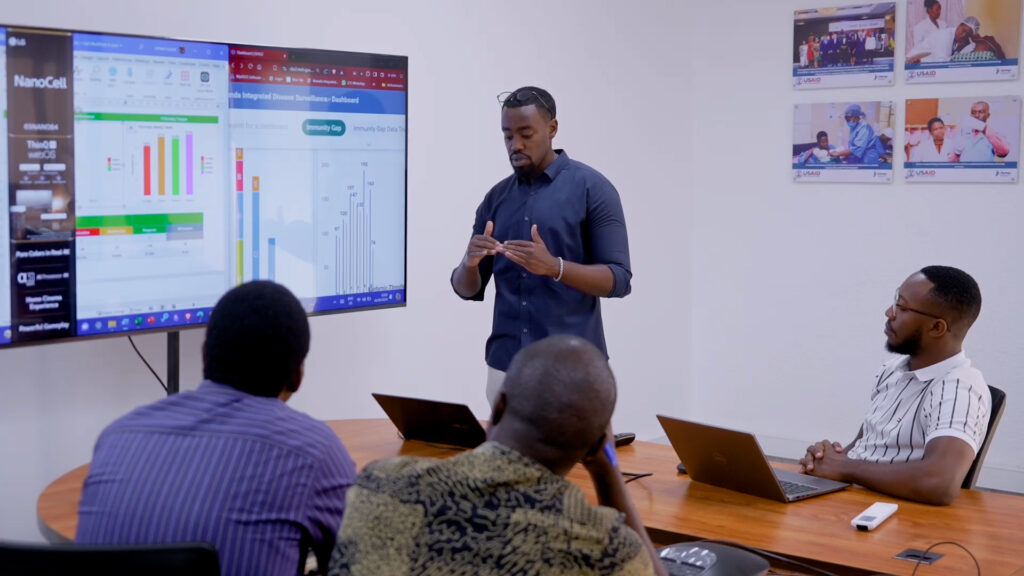We partnered with National Public Health Institutes in five African countries to detect outbreaks faster using early warning signals.
The challenge
Delayed detection of outbreaks leads to unnecessary deaths and economic disruption, but many countries lack systems to detect early warning signals.
The solution
Resolve to Save Lives, the U.S. Centers for Disease Control and Prevention (US CDC) and CDC Foundation partnered with five African countries—Liberia, Nigeria, Rwanda, Sierra Leone and Uganda—to develop and integrate event-based surveillance (EBS) systems that capture unconventional outbreak signals.
The impact
The five countries—now regional leaders in EBS—are detecting outbreaks faster, protecting communities and drawing global recognition and funding to sustain their work.
The challenge
How can early warning signals complement traditional surveillance to stop outbreaks?
When it comes to infectious disease outbreaks, delayed detection means more lives lost, more livelihoods upended and greater strain on health systems. Indicator-based surveillance—the routine collection and analysis of data from health facilities—plays a critical role in tracking trends, confirming suspected cases and guiding response efforts. By relying on standardized, validated data, indicator-based systems ensure accuracy and consistency in how diseases are monitored and outbreaks controlled.
But indicator-based surveillance is inherently reactive. It relies on individuals seeking care; health care workers correcting identifying symptoms; and cases being confirmed through laboratory testing—all of which take time. In many settings, these delays can stretch from days to weeks, creating blind spots during the critical early stages of an outbreak. When health systems rely solely on this approach, they risk missing the early warning signs of emerging threats when swift intervention could prevent widespread harm.
The solution
Event-based surveillance systems
Together with U.S. CDC and CDC Foundation, Resolve to Save Lives has been working with National Public Health Institutes in five countries to create and develop event-based surveillance, or EBS, systems. Unlike indicator-based surveillance, EBS picks up early, unconventional signals of outbreaks and involves authorities detecting events by monitoring media, hosting hotlines and speaking directly with impacted communities, providing a crucial head start to stop outbreaks quickly.
Through seven years of collaboration, training and systems building, Liberia, Nigeria, Rwanda, Sierra Leone and Uganda now stand as regional leaders in EBS. Their progress is saving lives, improving public health and earning recognition and funding from major global health institutions. Stephanie Salyer at U.S. CDC said: “EBS is a critical component of early warning capacity that all countries should have, and this collaborative project has allowed for the development of EBS best practices and tools that can support additional countries beyond this initial work.”
Building EBS capacities
Across the five countries, the team partnered with health authorities to strengthen EBS through a combination of system design, capacity building and community engagement. They began by developing national guidelines and standard operating procedures tailored to each country’s context to integrate EBS with traditional surveillance systems. Next, they established technical working groups to coordinate efforts across sectors and organized training sessions for health care workers, district surveillance officers and national focal points to ensure they could identify, verify and respond to early signals of outbreaks.
Engaging local communities
The team also led awareness campaigns and community outreach activities, especially in rural and hard-to-reach areas, to make sure traditional leaders and their communities understood the value of reporting health events. Across all five countries, these efforts relied on tools including the 7-1-7 target, Africa CDC’s Event Based Surveillance Framework and WHO’s Epidemic Intelligence from Open Sources (EIOS) platform, which allows real-time tracking of outbreak signals from news and social media. These efforts are laying the foundation for faster and more effective outbreak detection and response.
The impact
Improving capacities
Dr. Adeline Kabeja at the Rwanda Biomedical Centre described how implementing a new EBS system has shaped the country’s broader early warning, alert and response efforts: “The system improved timeliness of detection and response, created seamless integration of One Health surveillance and had a favorable impact on our national Joint External Evaluation (JEE) score.” The World Health Organization uses JEE scores to assess a country’s capacity to respond to public health emergencies.
Those improved capacities are already saving lives. When a boy in Rwanda was bitten by a stray dog, the EBS system immediately picked up the event and he received a rabies vaccine in time—an intervention that likely saved his life. Rabies is almost always fatal and needs to be treated within hours. Had the boy traveled to a health facility for treatment, it might have been too late. Thanks to the EBS system proactively finding unconventional signals on social media, cases like this one are managed quickly.
Building trust
In Liberia, community engagement has led to increased trust between local leaders, women’s groups and community health workers, who worked with our partners to implement EBS. As one community leader said: “Implementing an EBS system helped us create constant awareness. It allowed us to bring traditional leaders into the process, and they pushed the message to the communities.” This grassroots engagement is making sure that no early warning sign goes unnoticed in future outbreaks.
Regional leadership
Today, Liberia, Nigeria, Rwanda, Sierra Leone and Uganda stand at the forefront of event-based surveillance in Africa. Their work has become a model for neighboring countries, showing what is possible with sustained investment, strong partnerships and community trust. The recognition hasn’t gone unnoticed: both the Pandemic Fund and Global Fund have begun supporting EBS efforts, reinforcing the value of these investments. These countries are now positioned to support others, share lessons and continue innovating.
“Our partners are proving that with the right tools and partnerships, countries can move from reactive to proactive, catching outbreaks before they spiral and protecting the health and futures of millions,” said Dr. Christopher Lee at Resolve to Save Lives. “Event-based surveillance is giving countries a critical head start, especially when it works hand-in-hand with strong indicator-based surveillance systems. Together, they create a more complete picture—and change the trajectory of epidemics, one signal at a time.”
